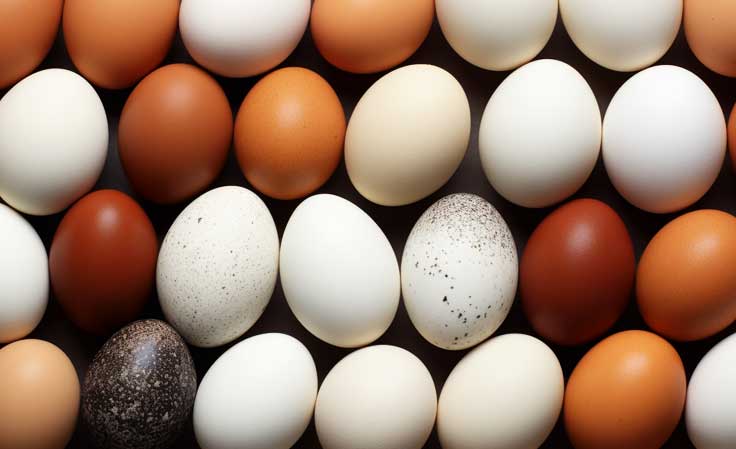Have you ever wondered about the delightful array of eggshell colors that can grace your breakfast table? From deep browns to vibrant blues and even pastel greens, the world of chicken eggs is a colorful one indeed.
Whenever I share my blue, pink, or green chicken eggs online, people are shocked to know that chicken eggs come in more colors than just white and brown!
All you will see at the store is the same old brown and white eggs. If you venture to a farmer’s market, you may see more colored eggs but maybe not.
You can have an array of rainbow egg layers in your flock. In this blog, we'll dive into the fascinating realm of chicken breeds that produce a rainbow of colored eggs. So, let's embark on this egg-citing journey!
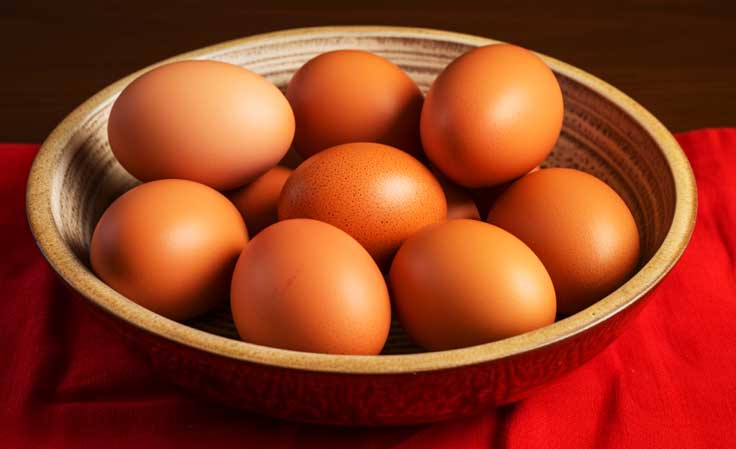
Rhode Island Red: A Brown Egg Classic
When it comes to dependable brown egg production, the Rhode Island Red stands tall. These robust birds are renowned for their consistent supply of rich, brown eggs. Their friendly disposition and ease of care make them a favorite among backyard poultry enthusiasts.
If you're looking for that classic brown egg for your morning omelet, the Rhode Island Red is an excellent choice.
It is important to know that pink-colored chicken eggs are generally from brown egg-layers, but the bloom, the protective layer on a chicken egg, varies in its amount making it pink-tinted.
I have some Rhode Island Reds that have given me some strong pink-colored eggs, but I know their nature is to have brown eggs.
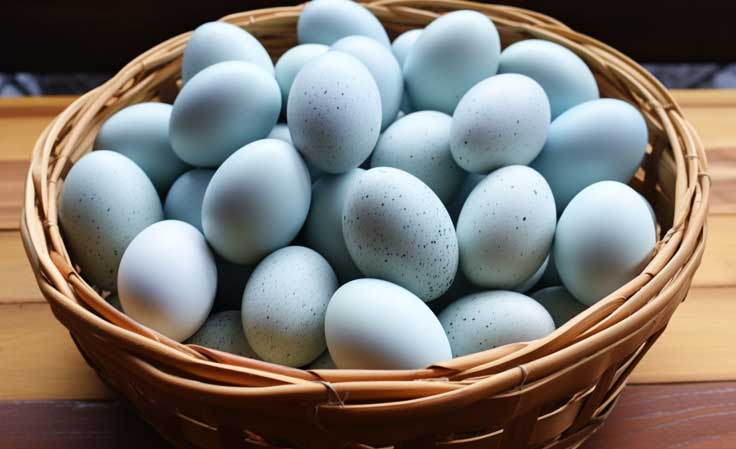
Araucana: The Blue and Green Egg Maestro
If you're in pursuit of something more exotic, the Araucana should pique your interest. These unique chickens lay eggs in shades of blue and green. With their distinct appearance, including ear tufts and a rumpless tail, Araucanas are not only great egg layers but also conversation starters in your flock.
I have one of these in my flock and they are quite flighty. I would suggest working with them from a young age to get them acquainted with you. Give treats regularly, so they don’t always run from you when you come out to the coop to collect eggs or do chores.
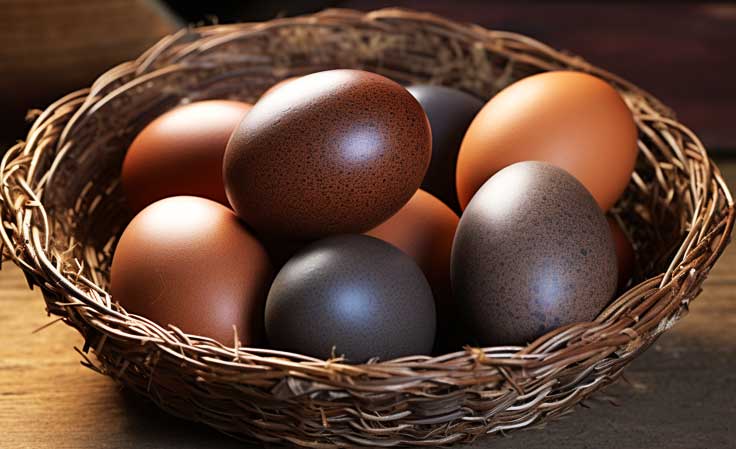
Marans: The Dark Brown Egg Specialists
Marans chickens are famous for their dark brown eggs, often referred to as "chocolate eggs." If you want to add a touch of elegance to your egg carton, Marans are the way to go. Their gentle nature and ability to thrive in various environments make them a valuable addition to any backyard flock.
Marans are dependable egg-layers as well. Because they have a larger body and fluffy build, they are more adapt to colder climates. If you live in a cold area like I do, they will be a good addition to your flock if you are still hoping for eggs throughout the winter.
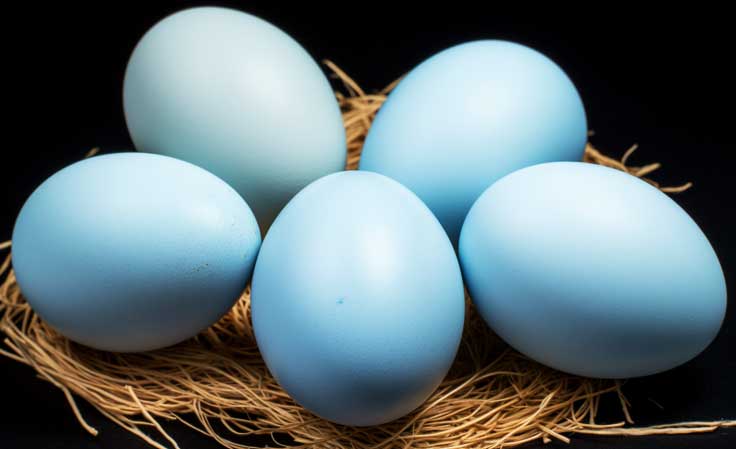
Ameraucana: The Creators of Blue Hues
For those who appreciate the subtle beauty of blue eggs, Ameraucanas are the breed of choice. These friendly chickens produce eggs in varying shades of blue, adding a touch of sophistication to your morning routine.
Ameraucanas are known for their docile temperament, making them a fantastic option for families.
I have an Ameraucana in my flock, and she loves to lay around the yard, not so much in the nesting box. Keep this in mind as you may be hoping for blue eggs in your nesting box only to find them in a hay bale across the yard.
The exotic layers seem to be more flighty than the traditional brown and white layers, so spend time getting to know them.
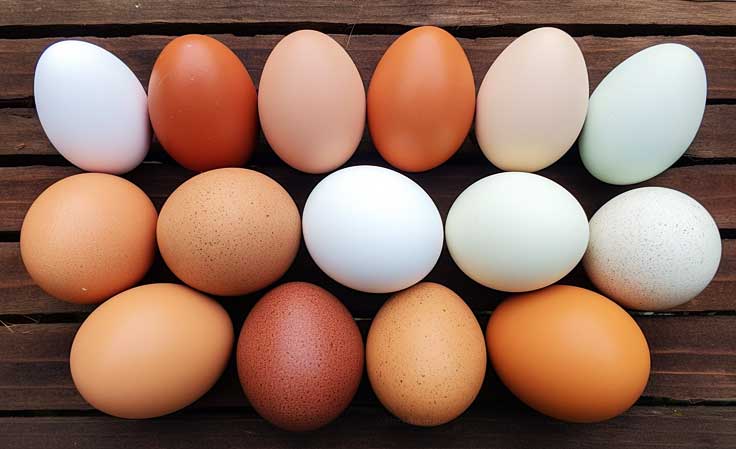
Easter Egger: A Splash of Colorful Surprises
Easter Eggers are a popular choice among beginners due to their multicolored egg production. They can lay eggs in shades ranging from pale blue to light green and even pink.
If you enjoy surprises in your egg basket, these chickens will keep you entertained. Their adaptability and hardiness make them an ideal choice for those new to chicken keeping.
These are a fun chicken breed for children as it will keep your children wondering what colored egg they are going to get from the chicken coop each day. Of course, if they decide to lay in the nesting boxes.
Factors Affecting Egg Color
The color of a chicken's eggs isn't solely determined by its breed. Several factors come into play, including diet and nutrition, the age of the hen, and the stress levels and environment. A well-balanced diet with appropriate nutrients can enhance the intensity of eggshell colors.
When temperatures are extreme, hot or cold, egg production can drop. I personally wouldn’t recommend supplementing heat or air conditioning just because this can throw off your chicken’s natural acclimation to their environment.
If the power goes out and they no longer have supplemental heat or air conditioning, they will have a hard time adjusting.
Breeding for Specific Egg Colors
If you have a specific eggshell color in mind, selective breeding is a viable option. By carefully choosing parent birds with the desired eggshell color genetics, you can influence the hues of the eggs your flock produces. It's a fascinating process that allows you to create a customized egg palette.
To do this, you will need to keep roosters in your flock with desirable traits. I would suggest choosing a friendly rooster who will hopefully pass on the traits you want, including temperament.
Egg Colors Beyond the Rainbow
While we've covered the most common eggshell colors, there are even more unique options out there. Olive Eggers, Pink Eggers, and other specialized breeds can add further diversity to your collection of colored eggs.
Exploring these breeds can be an exciting adventure for any chicken enthusiast.
Researching chicken breeders locally will be your best bet because those chickens will already be acclimated to the weather you have around your homestead.
You can order eggs, chicks, and chickens online but health will not be guaranteed and if they are not local, they won’t be as acclimated, so keep that in mind. You can selective breed the online chickens to have more suitable future generations for your homestead.
In the world of chicken keeping, the quest for colored eggs offers a delightful twist to the hobby. Whether you prefer the traditional brown eggs of the Rhode Island Red or the captivating blue hues of the Ameraucana, there's a breed out there to satisfy your eggshell color cravings.
So, go ahead, choose your favorite breed, and embark on your colorful egg-laying journey!
FAQs
How can I determine the eggshell color of a chicken breed?
The eggshell color of a chicken breed is typically mentioned in breed descriptions and can be confirmed through online resources or breed organizations.
Do all hens of the same breed produce the same egg color?
Not necessarily. While breeds have a general tendency for a certain egg color, individual hens may produce slightly different shades.
Can I influence the color of eggs my chickens lay?
Yes, you can influence eggshell color through diet, genetics, and selective breeding.
Are colored eggs as nutritious as white eggs?
Yes, colored eggs are just as nutritious as white eggs. The color of the shell doesn't affect the quality of the egg inside.
Which breed is the best choice for beginners wanting colored eggs?
Easter Eggers are an excellent choice for beginners as they are hardy, adaptable, and produce a variety of colored eggs.

